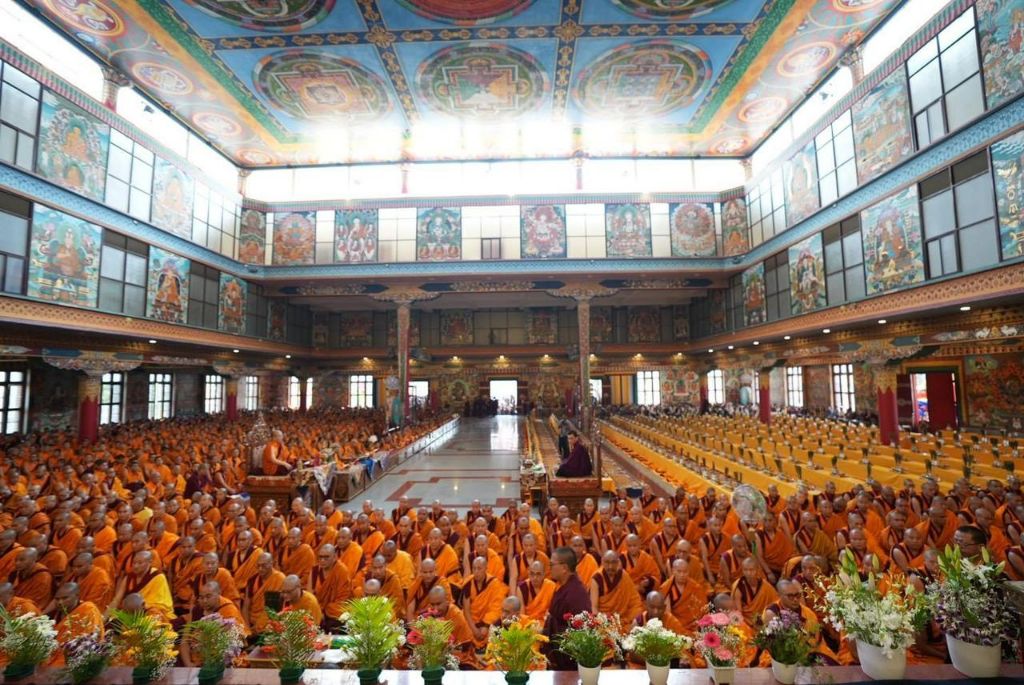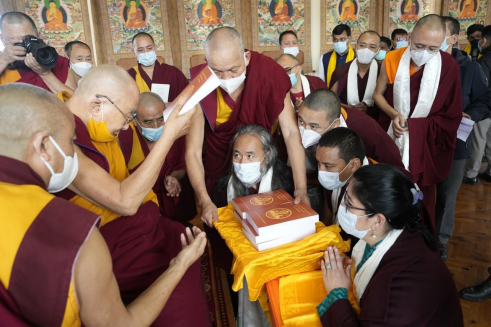Dear Friend,
Last week while watching the elaborate, historic, and really perfectly coordinated coronation of King Charles III, I found myself deeply moved. So much has already been said about the lavishness and even the anachronistic nature of having a monarch today, how it goes against our modern, democratic, individualistic sensibilities, etc. However, I found myself curious as to why this ceremony was so powerful and even clarifying for me. I could not help but compare the different enthronements of tulkus (or reincarnated lamas) and the many other ceremonial aspects of the Tibetan tradition, including the conferment of the khenpo title, or highest Buddhist degree, that parallels a coronation.
While watching the solemn face of King Charles III as he took each of the ritual offerings on a humble but sacred wooden throne, I transported myself back to a recent ceremony where I witnessed over 300 monastics become khenpos and khenmos in a historic achievement at Namdroling Monastery (founded by the Third Penor Rinpoche, and presided over by the current head of the Palyul lineage, Karma Kuchen Rinpoche).

Namdroling Monastery Confers 300 Khenpo and Khenmo Buddhist Degrees in a Historic Accomplishment
Both a coronation and a khenpo confirmation are highly choreographed for the principal subject and the larger audience. They each offer a deeply symbolic space for holding centuries of tradition, lineage, succession, and continuity. Both ceremonies publicly declare and affirm responsibility to serve a higher purpose: for the former, the subjects of the nation, and for the latter, all sentient beings. With the mantle of responsibility now bestowed upon the empowered, a vaulted ceiling for an exalted being is formed.
I recognize that in reference to these two ceremonies, the social and spiritual spaces are largely male-centric spheres of power. As a woman, I am still finding my way, consciously and unconsciously, to create space for activity and leadership. I am also reminded of the often-quoted statement attributed to Tara, bodhisattva of compassion:
“Those who wish to attain supreme enlightenment in a man’s body are many, but those who wish to serve the aims of beings in a woman’s body are few indeed; therefore may I until this world is emptied out, work for the benefit of sentient beings in a woman’s body.”
Tara’s promise here – to always be reborn as a woman – is another exalted space to set my eyes upon.
In today’s fractured world of shifting identities, vows, and promises, spiritual commitments and certainties are rare, and thus they are perhaps more precious than ever. It’s probably not very politically correct to talk about “sacrifice” as a way to cultivate an enlightened society, but I can’t help but think that we need more promise-keepers, more vows, and more bounded social spaces for us to not only survive but evolve. Though some promises may be temporary, I have the feeling that the very act of promising could help create a greater sense of freedom, honor, purpose, and dignity – a sacred architecture for our place in the world. When talking about the notion of a promise, my father surprises me and says it should be taken lightly. Though I will continue to contemplate what a promise taken lightly means, I wonder if lightly might mean the possibility of sharing responsibility, such as in the saying “many hands make light work.” Or maybe it is delighting in the promise, or in the lightness of effort, which is also known as one of the six paramitas in Tibetan as tsondu, or joyful effort.
Thank you for reading and supporting SINI’s unusual work to bridge millennial-old promises to the contemporary world. Please enjoy the following newsletter with highlights from our small but dedicated team of friends from around the world who have each made both extraordinary and gentle commitments to serve a higher purpose, to a tradition and language often not their own, along a path not so known.
Love,

Tsering Palmo Gellek
Founding Executive Director, SINI
